5 Essential Nutrients for a Healthy Diet
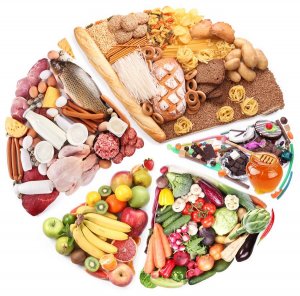
Human beings need a wide variety of nutrients to have energy and stay healthy. For this reason, when you create a healthy diet, you should pay special attention to make sure it includes the essential nutrients like vitamins and minerals that your body needs.
In this article, we’ll talk about the importance of different nutrients that you should include in your diet, and we’ll tell you which foods you can find them in. Don’t miss out!
Essential nutrients for a healthy diet
To be healthy, according to data provided by the Spanish Nutrition Foundation (Fundación Española de Nutrición), you should ingest about 50 nutrients which are grouped as:
- Carbohydrates
- Proteins
- Fats
- Minerals
- Vitamins
All of these nutrients are found in the foods you eat. Therefore, it’s just as important to combine them correctly to maintain your body functions and the energy you need for your daily life.
1. Essential nutrients: Carbohydrates
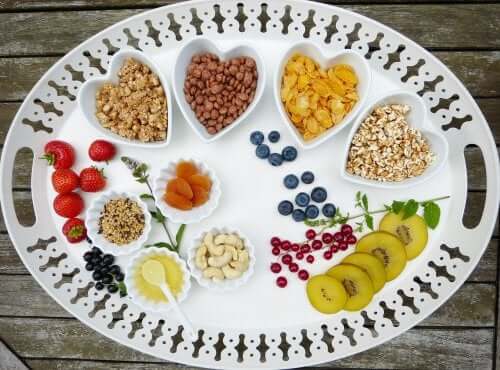
Carbohydrates are divided into monosaccharides, disaccharides, and polysaccharides. Their main function is to provide energy to your body. Additionally, they’re necessary for your nerve centers’ metabolism that uses glucose as a form of energy.
Include carbohydrates in your healthy diet to acquire about 60% of your calories from them. Choose brown rice, quinoa, oats, whole grain pasta, and fruits as a regular part of your healthy meals.
Indigestible carbohydrates are given the name of dietary fiber, a fundamental substance to regulate your digestive system, avoid constipation, and help prevent diseases like colon neoplasms and diabetes, among others. You should consume between 20 and 40 grams of these daily.
2. Proteins
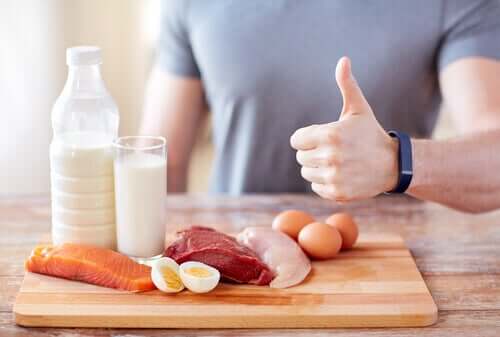
Protein is necessary to create and repair your body’s cells since these are mainly made up of protein. Between 10 and 15% of your daily calories should come from proteins.
It’s important to highlight that proteins are made up of amino acid chains, from which you have to obtain eight from your foods because the body cannot make them.
You might be interested in: Protein Shakes: Why Are They Beneficial?
3. Essential nutrients: Lipids
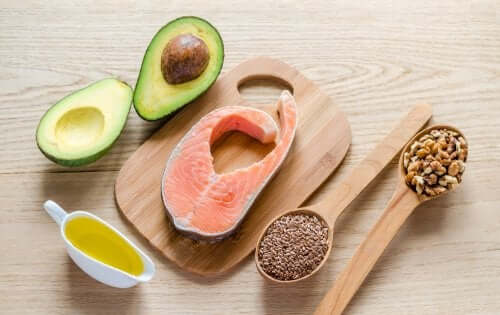
Healthy lipids contain linoleic and linolenic acid, two essential nutrients for your nervous system and cardiovascular system. Additionally, they carry vitamins A, D, E, and K, and help absorb them.
However, because of their possible relation to cardiovascular diseases and cancer, they shouldn’t provide more than 30% of your total energy for a healthy diet. Plus, you should always choose essential fatty acids. We recommend you also include extra virgin olive oil, avocado, and seafood in your diet.
4. Minerals
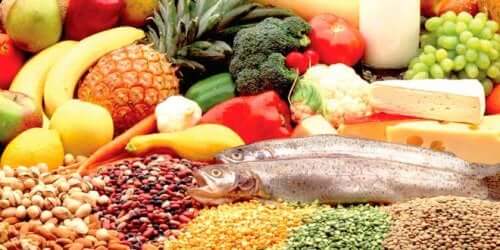
Minerals are important because they make up the structure of many tissues, like bones. Likewise, they make up part of your hormones and enzymes. Among them the most important ones are:
- Calcium: This is fundamental for maintaining your bone health, especially during growth and pregnancy. You can find it in dairy products like milk and cheese, and also almonds and other nuts.
- Iron: An iron deficit can cause iron-deficiency anemia. It’s important because it makes up part of the hemoglobin of blood that transports oxygen through your whole body. Get it through meat, dried fruits, beans, and vegetables like spinach and broccoli.
- Iodine plays an important role in thyroid functions. The main sources of iodine are blueberries, Himalayan rock salt, natural yogurt, and cod.
- Magnesium helps to metabolize carbohydrates, makes up intracellular enzymes, and promotes neuromuscular activity. You can find it in spinach, broccoli, avocado, and salmon, among other foods.
- Zinc is an integral part of different enzymes. To eat it you should add fish, oysters and shellfish, meat, dried fruits, beans, cucumber, and plantains to your weekly meals.
- Potassium is important to prevent insomnia, dysrhythmias, and muscle weakness. You can find it in meat, fish, vegetables, and fruits.
- Sodium is necessary mainly for transmitting nerve impulses. However, this is one mineral that we often get too much of. We recommend moderate consumption (2 g per day). You can get it from eggs, liver, dried fruits, and table salt.
Read also: Iron Deficiency Anemia: Dietary Guidelines
5. Vitamins
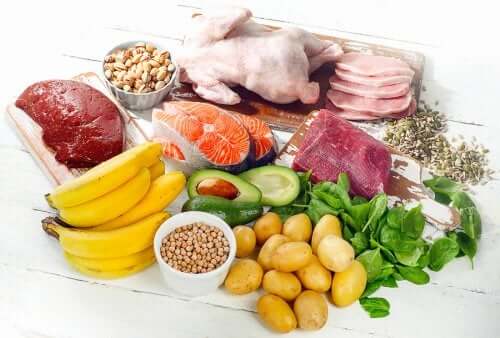
Your body needs vitamins to be able to turn food into energy. They play an important role in the regulation of metabolic enzymes.
We’ll introduce the main ones here:
- Folic acid is a B-complex vitamin that is part of DNA synthesis. This is why it’s important to eat it before and during pregnancy. It’s mostly found in the leafy greens, beans, and liver.
- Thiamine, or vitamin B1, is essential for development and growth. You can get it from beans, liver, eggs, and whole grains.
- Riboflavin, or vitamin B2: Among other things, it promotes the creation of red blood cells and antibodies. Milk, cheese, egg whites, and dried fruits are sources of this vitamin.
- Cyanocobalamin, or vitamin B12, stimulates the cells in charge of bone formation in addition to helping metabolize fats. You can find it in meat, fatty fish, and eggs, among others.
- Vitamin C is a cellular protector and antioxidant. You can get it from citric fruits, gooseberries, kiwi, strawberries, vegetables, liver, and kidney.
- Tocopherol, or vitamin E: This vitamin is an antioxidant, working to protect cell membranes from free radicals. Olive oil, grains, dried fruits, and vegetables are good sources of this nutrient.
Overall, these are just a few of the essential nutrients for a healthy diet, but not all of them. As we mentioned at the start of the article, a balanced diet includes 50 nutrients. Talk to a nutritionist to create a diet plan according to your nutritional needs.
All cited sources were thoroughly reviewed by our team to ensure their quality, reliability, currency, and validity. The bibliography of this article was considered reliable and of academic or scientific accuracy.
- Landi F., Calvani R., Tosato M., Martone AM., et al., Protein intake and muscle health in old age: from biological plausibility to clinical evidence. Nutrients, 2016.
- Wilczek MM., Olszewski R., Krupienicz A., Trans fatty acids and cardiovascular disease: urgent need for legislation. Cardiology, 2017. 138 (4): 254-258.
- Ang A., Pullar JM., Currie MJ., Vissers MCM., Vitamin C and inmmne cell function in inflammation and cancer. Biochem Soc Trans, 2018. 46 (5): 1147-1159.
This text is provided for informational purposes only and does not replace consultation with a professional. If in doubt, consult your specialist.








